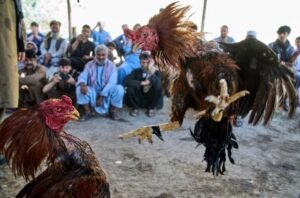“compiled: Irandokht Atashi”
In what is rapidly becoming one of the most disturbing criminal investigations in recent Philippine history, authorities are now focusing their search on the depths of Taal Lake—a volcanic body of water just south of Manila—as the possible burial site of dozens of men who vanished after being accused of cheating in online cockfighting matches.
The Disappearances
Between April 2021 and January 2022, 34 men disappeared under mysterious circumstances. Their common link: all were allegedly involved in rigging matches in the highly lucrative “e-sabong” industry, a digital version of cockfighting that surged in popularity during the COVID-19 pandemic. With in-person matches banned during lockdowns, online platforms raked in billions of pesos in bets, turning e-sabong into a gambling juggernaut—and, now, possibly a deadly one.
Most of the missing were last seen in or around the Manila Arena, where several now-indicted security guards were employed. Investigators believe the arena served as a staging ground for the disappearances.
A Shocking Confession
The case took a harrowing turn when a man identifying himself only as “Totoy” came forward in an interview, alleging that he had been part of an operation that interrogated the victims before they were handed over to another group—never to be seen again.
Totoy’s claims are grim: he says the men were strangled with wire and their bodies dumped in Taal Lake, where volcanic conditions would make recovery and identification extremely difficult. He warned that the number of victims may exceed 100, hinting that the killings could also include drug lords and others lured under false pretenses.
“If we dig them up, it’s just bones. How can we recognize them?” he said, underscoring the scale of the cover-up.

Lake Taal: From Scenic Wonder to Suspected Crime Scene
Taal Lake, known for its beauty and its surrounding active volcano, is now under a dark cloud of suspicion. Justice Secretary Crispin Remulla confirmed on June 19 that divers may be deployed to search its waters.
“This can’t be swept under the rug,” Remulla said. “We have a responsibility to the victims’ families and to the public to find the truth.”
The Philippine Navy has stated it is prepared to assist the operation, with the Naval Special Operations Command on standby pending formal requests.
Cracks in a Shadow Industry
While traditional cockfighting is legal and culturally embedded in the Philippines, the rapid rise of e-sabong during the pandemic created a loosely regulated, high-stakes environment. At its peak, e-sabong generated over 620 million pesos ($10.8 million) in monthly licensing revenue. Daily wagers reached a staggering 3 billion pesos ($52.4 million), prompting concerns from lawmakers and religious groups alike.
Amid growing scandals—including links to human trafficking and online fraud—then-President Rodrigo Duterte banned e-sabong in 2022. Still, the damage was done, and the criminal fallout continues to unravel.

Seeking Justice Beneath the Surface
Authorities are now pursuing multiple leads. According to the Philippine Star, at least five individuals have spoken to investigators. Totoy, the first and only suspect to publicly come forward, says he’s doing so at great personal risk, driven by guilt and a desire to aid the victims’ families.
But with each disturbing detail, the mystery deepens—and so does the urgency to act.
As Taal Lake prepares to yield its secrets, the case has moved beyond the realm of gambling gone wrong. It now threatens to expose a vast, brutal network operating beneath the surface of one of the Philippines’ most popular pastimes.
If Totoy’s claims are substantiated, Taal Lake may hold the key to uncovering what could be one of the largest mass killings in the nation’s recent memory.

 English
English



























































